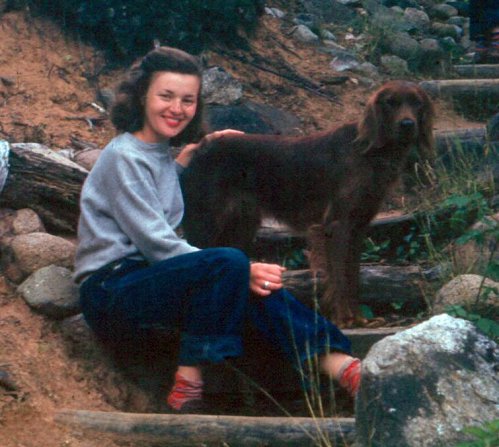Carol’s mom left us ten years ago today. I miss her; she accepted me into her family quickly and the warmth I felt in her presence never faded as long as she lived. I wrote an entry in her memory on February 4th, 2013, which I will republish here verbatim, to remind myself and all of us how truly good people affect everyone and everything around them for the better.

Carol’s mom has left us. She died quietly this past Saturday after a long illness, at a nursing facility near her Crystal Lake, Illinois home. Her daughter Kathy was by her bedside, and her two grandsons Brian and Matthew had visited her earlier that day. She was 88.
Most people in our time are lucky to have two loving parents. Somehow, incredibly, I had four. I met Delores on August 2, 1969, when I came by their house to pick up Carol for our first date. I was 17, a little scruffy, and undoubtedly, well, odd. No matter. Delores smiled and welcomed me, a welcome that never faded. Carol’s dad was a slightly harder sell, but I won his esteem by treating his daughter with respect and kindness. When I bought a lathe in 1977 he stabled it in his basement, and over time he taught me what he knew about its use, which (considering that he could grind a carbide die to a ten thousandth of an inch accuracy) was pretty much everything.
On many Sundays Delores prepared family dinners for which her sisters Marie and Bernice and her Aunt Marie and Uncle John drove up from the South Side. Pork roast, salad, vegetables, bread, dessert; a huge spread brought to the table hot and perfect in all ways. I had a place at that table, as later on Kathy’s boyfriend/fiance/husband Bob did as well. It was decades before I knew the term for the feeling that hovered all about us in Delores’ dining room, but when I found it, many things fell into place. It was unconditional love.
I had had that from my own parents, of course. And even my own father was a bit of a hard sell, since I bore little resemblance to the rowdy boy that he himself had been and expected his own son to be. All the more remarkable that Delores and Steve embraced me almost immediately as one of their own.
Delores was a child of Polish-American heritage, youngest daughter of a large family, who was born and grew up on the Near South Side of Chicago. She belonged to a group of very close teen girlfriends who called themselves The Comets. They were capable and confident girls, journeying around the city for fun, and even slept on the sand of Chicago’s 31st Street Beach. She quietly rejected the dour Polish pessimism of her own parish church, and far preferred the exuberant Catholic culture of an Irish parish a few blocks away. She believed all her life in an infinitely loving God and the goodness of all His creation. When I began struggling with my own life of faith at the dawn of middle age, it was her example that helped bring me to the unbounded and unshakable Catholic optimism that I hold today.
Delores worked at the US Treasury in downtown Chicago, where she helped trace lost and stolen US Savings Bonds. During WWII she met and in 1947 married Steve Ostruska, one of her brother Charlie’s Navy shipmates. After Carol was born the family moved to Niles, Illinois, where Delores lived for over forty years before moving in with her daughter Kathy in Crystal Lake.
Every summer while the girls were small the family vacationed along the lakes near Hayward, Wisconsin, where Steve fished for walleye and city girl Delores learned to love the outdoors. The photo at the head of this entry is from a vacation that she and Steve took to Clam Lake in July 1948. It’s not fair to picture her as an elderly woman when she has already broken the bonds of this Earth and risen triumphantly into the arms of the God she so strongly believed in. I prefer to recall her as the beautiful, vigorous person she was most of her life. In truth, all the time I knew her she glowed wth the quiet, invincible light of unconditional love, and if there’s anything closer than that to the ineffable light of God, I don’t expect to see it in this world.











